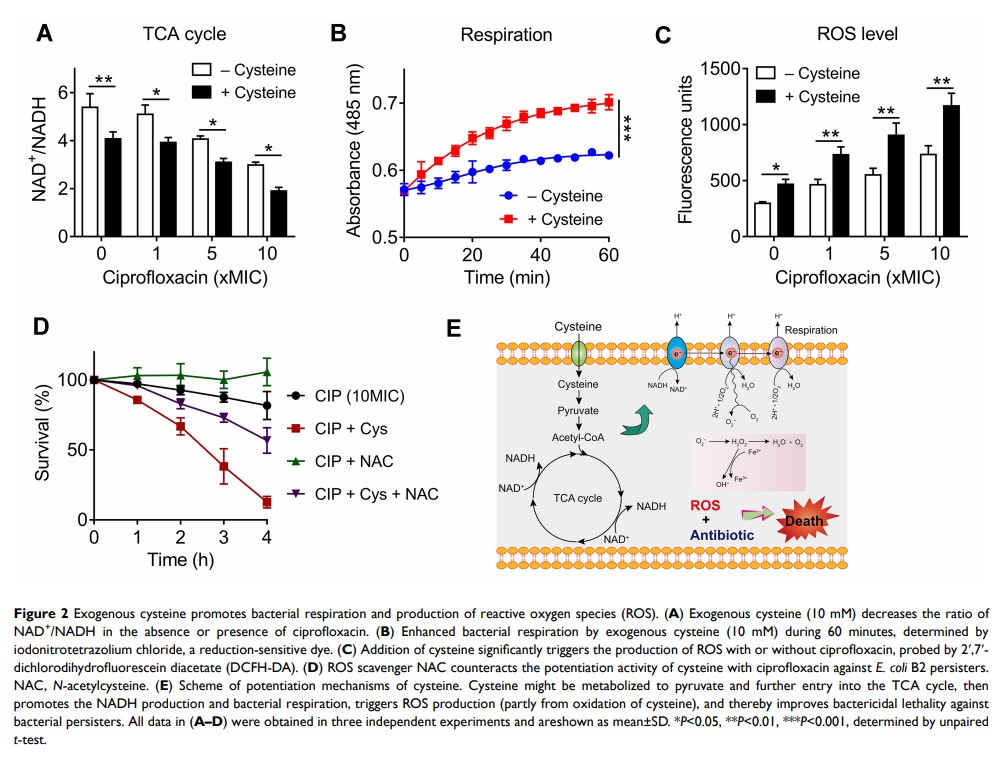109814
论文已发表
注册即可获取德孚的最新动态
IF 收录期刊
- 3.4 Breast Cancer (Dove Med Press)
- 3.2 Clin Epidemiol
- 2.6 Cancer Manag Res
- 2.9 Infect Drug Resist
- 3.7 Clin Interv Aging
- 5.1 Drug Des Dev Ther
- 3.1 Int J Chronic Obstr
- 6.6 Int J Nanomed
- 2.6 Int J Women's Health
- 2.9 Neuropsych Dis Treat
- 2.8 OncoTargets Ther
- 2.0 Patient Prefer Adher
- 2.2 Ther Clin Risk Manag
- 2.5 J Pain Res
- 3.0 Diabet Metab Synd Ob
- 3.2 Psychol Res Behav Ma
- 3.4 Nat Sci Sleep
- 1.8 Pharmgenomics Pers Med
- 2.0 Risk Manag Healthc Policy
- 4.1 J Inflamm Res
- 2.0 Int J Gen Med
- 3.4 J Hepatocell Carcinoma
- 3.0 J Asthma Allergy
- 2.2 Clin Cosmet Investig Dermatol
- 2.4 J Multidiscip Healthc

半胱氨酸可增强杀菌性抗生素针对革兰氏阴性细菌持留菌的杀菌活性
Authors Liu Y, Yang K, Jia Y, Shi J, Tong Z, Wang Z
Received 18 May 2020
Accepted for publication 16 July 2020
Published 28 July 2020 Volume 2020:13 Pages 2593—2599
DOI https://doi.org/10.2147/IDR.S263225
Checked for plagiarism Yes
Review by Single anonymous peer review
Peer reviewer comments 2
Editor who approved publication: Professor Suresh Antony
Purpose: Bacterial metabolism regulators offer a novel productive strategy in the eradication of antibiotic refractory bacteria, particularly bacterial persisters. However, the potential of amino acids in the fight against Gram-negative bacterial persisters has not been fully explored. The aim of this study is to investigate the potentiation of amino acids to antibiotics in combating Gram-negative bacterial persisters and to reveal the underlying mechanisms of action.
Methods: Bactericidal activity of antibiotics in the absence or presence of amino acids was evaluated through detecting the reduction of bacterial CFUs. The ratio of NAD+/NADH in E. coli B2 persisters was determined using assay kit with WST-8. Bacterial respiration and ROS production were measured by the reduction of iodonitrotetrazolium chloride and fluorescent probe 2′,7′-dichlorodihydrofluorescein diacetate, respectively.
Results: In this study, we found that cysteine possesses excellent synergistic bactericidal activity with ciprofloxacin against multiple Gram-negative bacterial persisters. Furthermore, the potentiation of cysteine was evaluated in exponential and stationary-phase E. coli ATCC 25922 and E. coli B2. Interestingly, cysteine significantly improves three bactericidal antibiotics killing against stationary-phase bacteria, but not exponential-phase bacteria, implying that the effect of cysteine correlates with the metabolic state of bacteria. Mechanistic studies revealed that cysteine accelerates the bacterial TCA cycle and promotes bacterial respiration and ROS production. These metabolic regulation effects of cysteine re-sensitive bacterial persisters to antibiotic killing.
Conclusion: Collectively, our study highlights the synergistic bactericidal activity of bacterial metabolism regulators such as cysteine with commonly used antibiotics against Gram-negative bacterial persisters.
Keywords: amino acids, bacterial persisters, bactericidal antibiotics, cysteine, gram-negative bacteria
